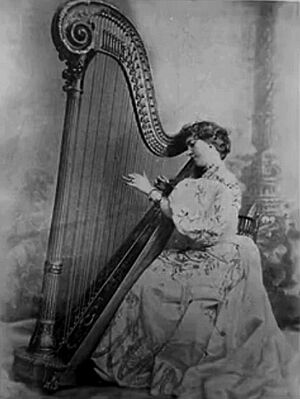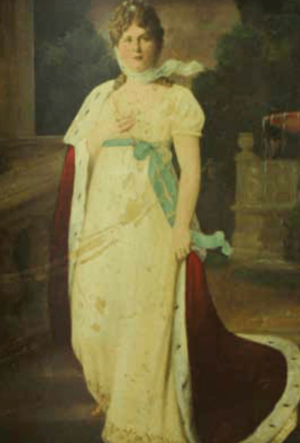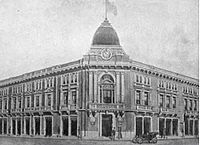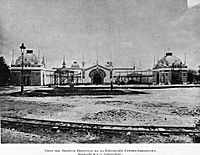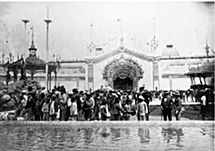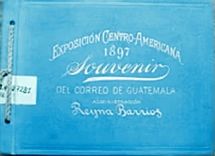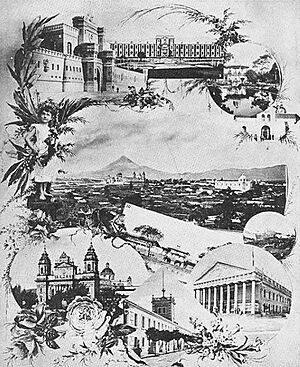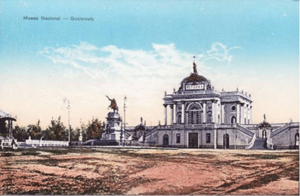José María Reina Barrios facts for kids
Quick facts for kids
General of Division
José María de Jesús Reina Barrios
|
|
|---|---|
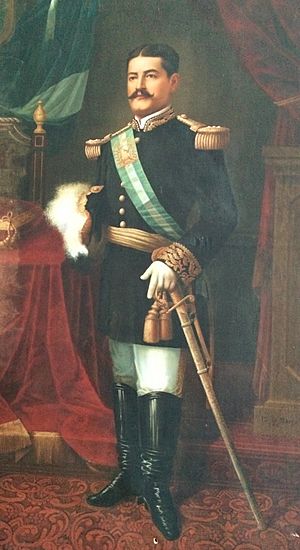
Portrait, Museo Nacional de Historia de Guatemala
|
|
| 15th President of Guatemala | |
| In office 15 March 1892 – 8 February 1898 |
|
| Preceded by | Manuel Lisandro Barillas Bercián |
| Succeeded by | Manuel Estrada Cabrera |
| Personal details | |
| Born | 24 December 1854 San Marcos, Guatemala |
| Died | 8 February 1898 (aged 43) Guatemala City, Guatemala |
| Political party | Liberal |
| Spouse | Algeria Benton |
| Children | He did not have any children with Argelia Benton; but he did have five children out of wedlock, among them Joaquín and José. |
| Parents | Joaquín Reina Celia Barrios de Reyna |
| Residence | Guatemala City |
| Alma mater | Escuela Politécnica |
| Occupation | Military |
| Signature | |
| Nicknames | "Reinita" "Don Chemita" "Tachuela" "Man of the tragic eights" |
José María Reyna Barrios (born December 24, 1854 – died February 8, 1898) was the 15th President of Guatemala. He served from March 15, 1892, until his death in 1898. He was born in San Marcos, Guatemala. People often called him Reynita, which means "little Reina," because he was not very tall.
He was a member of Guatemala's Liberal Party. He worked to continue some of the changes started by an earlier president, Justo Rufino Barrios.
Contents
Political Journey
Reyna Barrios was the nephew of President Justo Rufino Barrios. This connection helped him start his career in politics. After his uncle's sudden death in 1885, Reyna Barrios became more active in politics.
However, the next president, Manuel Lisandro Barillas, was worried about Reyna Barrios's popularity. So, he sent Reyna Barrios to Europe. He said it was for a diplomatic job, but the job never happened. Reyna Barrios ended up staying in Europe and the United States for several years.
The 1892 Presidential Election
Reyna Barrios eventually returned to Guatemala. He arrived just in time to run in the 1892 presidential election. This election was special because it was the first time candidates could advertise in local newspapers.
Here were some of the candidates:
| Name | Party | Other information |
|---|---|---|
| Lorenzo Montúfar | Liberal | He was criticized for spending money to publish his portrait in newspapers. |
| Francisco Lainfiesta | Liberal | He shared his government plans in a newspaper, using the freedom of the press. |
| José María Reyna Barrios | Liberal | He was the one who won the election. |
| Miguel Enríquez | Conservative | He used to be a liberal but became a conservative. |
| José Carranza Llerena | Conservative | He was a doctor for President Barillas. |
President Barillas Bercian was different from other liberal presidents of his time. He peacefully gave up power to his successor. Before the election, he met with the three main Liberal candidates. He wanted to know their plans if they became president.
He asked Francisco Lainfiesta and Dr. Montúfar about their plans. Both said they would follow the Constitution strictly.
Then, General Reyna Barrios came in. When Barillas asked him the same question, Reyna Barrios smiled and said, "We are very similar, General. I will know how to respect and protect you." They shook hands warmly.
At first, the voting seemed to favor Lainfiesta. But on the third day, many Indigenous people from Quetzaltenango and Totonicapán came to vote for Reyna Barrios. The official helpers made sure Reyna Barrios won. He became President on March 15, 1892.
His Time as President
During Reyna Barrios's time in office, he made many changes. He worked to make Guatemala City look grander. He built wide avenues, similar to those in Paris, France.
He also made sure Guatemala hosted the first "Exposición Centroamericana" (Central American Fair) in 1897. This fair was meant to show off Guatemala's progress to people from other countries.
Building New Things
To prepare for the Central American Fair, his government made the city more beautiful. They built new avenues and monuments. He also worked on the Northern Railroad of Guatemala. Many of these buildings were later destroyed by earthquakes in 1917-1918.
His government also improved roads and set up telegraph lines for national and international communication. They also brought electricity to Guatemala City. A major goal was to finish a railway that would go across the country. This was important to attract international businesses before the Panama Canal was built.
| Monument | Image | After 1917-1918 Earthquakes | Location | Description |
|---|---|---|---|---|
| Central Square Remodeling |   |
  |
Guatemala City Center | The Central Square was updated for the Central America Fair. An old fountain was removed, and a new iron fence was added. |
| Presidential Palace |   |
  |
Central Square | Reyna Barrios hired an architect to build this palace. It was finished in 1896 and served as the government's main building until it was destroyed by the 1917-1918 earthquakes. |
| "30 de junio" Boulevard |  |
 |
Southern part of Guatemala City. | This avenue was built to honor the Liberal Reform of 1871. Many monuments and buildings were along this road. Only some statues survived the earthquakes. |
| "La Reforma" Palace and Museum |   |
 |
"30 de junio" Boulevard | This palace and museum was popular with visitors. It was destroyed by the 1917-1918 earthquakes. Later, a monument to Independence was built in its place. |
| Central American Fair Hall |  |
N/A | "30 de junio" Boulevard | This building was made specifically for the Central American Fair in 1897. |
| Real Estate Record Office | N/A |  |
Old plaza of Guatemala City | This was one of the few buildings that survived the 1917-1918 earthquakes. It later became the National History Museum. |
| Indigenous Agriculture School |  |
 |
"La Aurora" city park | This school was in "La Aurora" city park. It was later used for a teacher's college but was destroyed by the 1917-1918 earthquakes. |
His Death
José María Reina Barrios was assassinated on February 8, 1898, in Guatemala City. He was killed by Edgar Zollinger, a British citizen. Zollinger acted in revenge for a past conflict involving Juan Aparicio, a former mayor of Quetzaltenango.
Images for kids
See also
 In Spanish: José María Reina Barrios para niños
In Spanish: José María Reina Barrios para niños
- Exposición Centroamericana
- History of Guatemala
- Northern Railroad of Guatemala
- Manuel Estrada Cabrera
 | William L. Dawson |
 | W. E. B. Du Bois |
 | Harry Belafonte |


